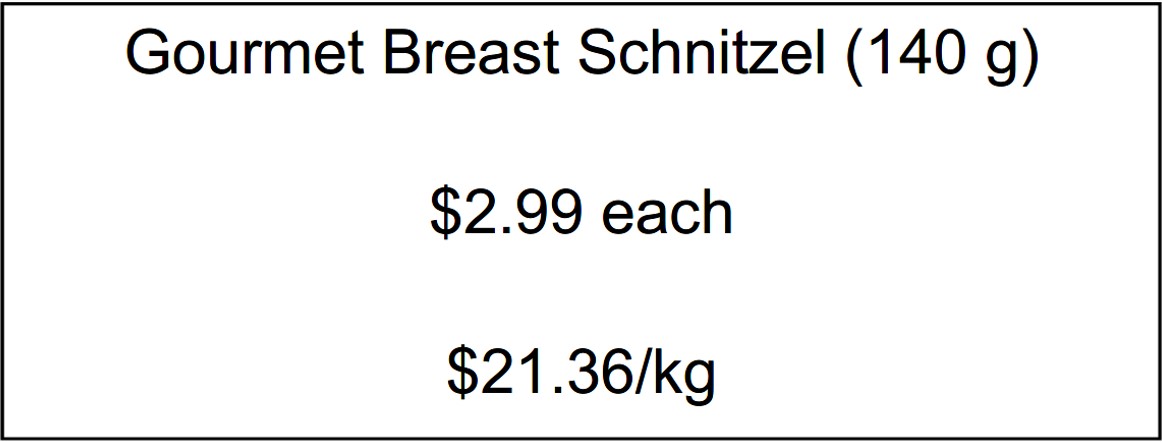Trade measurement laws regulate the retail and wholesale sale of meat.
Selling by weight
You must sell the following types of meat by weight:
- amphibians, such as frogs
- birds such as chicken, duck, emu, geese, guineafowl, ostrich, pheasant, quail, squab and turkey
- buffalo
- camel
- cattle
- deer
- donkey
- goat
- hare
- horse
- kangaroo and wallaby
- pig
- reptiles including crocodile
- sheep.
You must sell the following types of offal of the animals listed above by weight:
- cheek
- liver
- spleen
- tail
- tongue
- tripe.
Processed meat
You must sell processed meat by net weight. This includes meat processed by:
- adding preservatives, colourings or flavours
- boning
- cooking except where you sell to the customer on the premises where you cook it
- crumbing such as chicken schnitzels made from whole pieces of chicken
- curing
- dicing
- drying
- freezing
- glazing
- marinading
- mincing
- pickling
- salting
- seasoning
- shredding
- slicing or trimming
- smoking
- tenderising.
Price of meat when deboned, trimmed, or cut
The price you charge your customer can be the full weight of the meat before you debone, trim, or cut it. However, you should offer the off-cuts to the customer as part of the sale.
Selling per item
You can't sell per item meat products by displaying only the 'each price'. For example, you can’t just sell chops at $2 each or entire roasts at $40. You must also advertise both the weight and price per kilogram close to the item's 'each price'.

Example price label for a Gourmet Breast Schnitzel with a listed weight of 140g. The example label shows how there is also a price per weight of $21.36/kg, displayed directly under the item price of $2.99 each.
Meat not sold by weight
You do not have to sell the following by weight:
- rabbit
- some offal such as brains, feet and heads
- meat you cook on the premises where you sell it
- blended meat such as hamburgers, pastrami, sausages
- combined meat such as shish kebab, stir fry, rissole or meat loaf
- fermented meat such as salami
- filled meat or value added products such as chicken kiev
- reconstituted or pressed formed meat such as chicken nuggets, devon or chicken schnitzel made from reconstituted meat
- stuffing
- meat sold as part of a meal such as steak and chips.
If you do decide to sell these items by weight, you must follow the regulations for selling meat by weight.
Using scales
If you use a scale to weigh and sell meat that isn’t pre-packaged, you must ensure that:
- the National Measurement Institute (NMI) has approved your type of scale and any attached point-of-sale (POS) system
- a servicing licensee has verified your scales and POS system
- all products are sold net weight but don’t include the packaging weight such as plastic bags or trays
- you and your staff use the scales in the correct manner, for example ensuring its level and indicating zero before use
- you keep the scales clean and in good working order
- a servicing licensee verifies the scales after each repair or adjustment.
You're responsible for making sure the scale is correct at all times. We recommend that you have all your scales checked regularly by a technician licensed by a NMI servicing licensee. For a list of servicing licensees, email tmlicensees@measurement.gov.au.
Written statement
You must position the scales so that the customer can easily see the weighing process. If the customer is not present or can't see the scale, you must give them a clear written statement.
The statement must include the weight of each cut, on which the price is based. This statement could be on the outside of a package or on an invoice accompanying the order.
Pre-packaged meat
A pre-package is an item that:
- is not made to a specific customer order
- has had its quantity determined before being offered for sale
- has been put in packaging before being offered for sale.
If you sell pre-packaged products, you must:
- label each package with the weight of the product
- label each package with the name and address of the packer unless you pack them on the same premises where you sell them
- only display the net weight of the product and not include the weight of any packaging.
Pet food and bones in pre-packages must also meet the same requirements as other meat products.
You should print weight statements either on labels attached to the package or directly on the package itself. When you pack and sell meat on the same premises, you can hand-write the statement.
The weight statement must be:
- clear to read, at least 2 mm from the edge of the principal display panel and at least 2 mm from other graphics
- in the same direction as the brand or product name
- in a colour that provides a distinct contrast with the colour of the background.
In addition, if the packages are not all the same weight, you must mark the total price and price per kilogram either:
- on the package in the same format as the weight statement
- immediately adjacent to the package in characters at least 10 mm high.
Read the Guide to the sale of pre-packaged goods to find out more.
Regulating the sale of meat
The National Measurement Act 1960 and the National Trade Measurement Regulations 2009 regulate how meat is sold using measurement.
NMI employs trade measurement inspectors across Australia. We regularly inspect meat sellers to ensure that they're following the correct processes.
If an inspector finds that you are short-measuring your customers, you could be fined up to $313,000 per offence.
